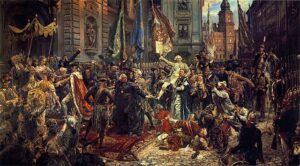On May 3, 1791, King Stanislaus Augustus Poniatowski of Poland together with the representatives of the Polish people promulgated a constitution that in its preamble read: “desiring to take advantage of the season in which Europe finds itself and of this dying moment that has restored us to ourselves, free of the ignominious dictates of foreign coercion, holding dearer than life, than personal happiness the political existence, external independence and internal liberty of the people whose destiny is entrusted to our hands […] for the establishment of liberty, for the preservation of our country and its borders, with the utmost constancy of spirit [we] ordain the present constitution”.
The event resounded throughout Europe and beyond. In one of his letters of late July 1791, George Washington, the first president of the United States, commented with satisfaction that Poland “appears to have made large and unexpected strides towards liberty”. The document was the first modern constitution in Europe, preceding a few months the French revolutionary act (1791), and the second in the world only after the US constitution (1787). It followed Montesquieu’s tripartite system of moderate government rooted in the concept of the rule of law.

However, the May 3 Constitution became something much greater than a statute of government. It originated in the long Polish political tradition of law protecting individual freedom from royal encroachments, dating back at least to the 15th century. Besides, it contrasted with absolutist tendencies holding sway in the neighboring monarchies – Austria, Prussia, and Russia. The Constitution – very much like its US precedent – was, therefore, an idea of a modern political nation seeking the best ways to establish a good government under law and God.
Promulgating the Constitution was the founding moment of the Polish modern political nation. And it had been viewed so from the very beginning as the date of the proclamation was announced a public holiday in Poland two days later. Unlike in the US, the constitution did not survive after the diplomatic and military interventions of the neighboring powers. Poland was partitioned and wiped out from maps. For generations, however, the constitution remained a symbol of Polish longing for freedom and sovereignty and the May 3 was reinstated as a public holiday in 1919 after Poland had reemerged from the WWI struggles. For its powerful patriotic significance and liberty-charged symbolism, the holiday was banned by the Nazis and communists, yet the memory of the constitution never faded.
The Panelists:
• Prof. Dorota Pietrzyk-Reeves – Professor at the Jagiellonian University in Krakow,
• Prof. Richard Butterwick – Professor of Polish-Lithuanian History at the UCL School of Slavonic and East European Studies,
• Prof. Martyn Rady – Emeritus Professor at the UCL School of Slavonic and East European Studies,
• Dr. Kevin Butterfield – Executive Director of the Fred W. Smith National Library for the Study of George Washington at Mount Vernon.
Chair:
Dr. Wojciech Kozłowski – Director of the Pilecki Institute, Warsaw
The event takes place on 29 April 2021 at 6 pm CEST.




